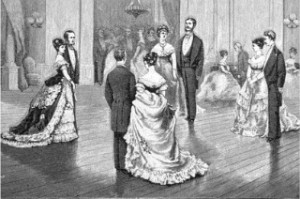This is another interesting tidbit from Light and Shadows of New York Life, 1875 – all about how to throw a good party.
New York has long been celebrated for its magnificent social entertainments. Its balls, dinner parties, receptions, private theatricals, picnics, croquet parties, and similar gatherings are unsurpassed in respect to show in any city in the world. Every year some new species of entertainment is devised by some leader in society, and repeated throughout the season by every one who can raise the money to pay for it. The variety, however, is chiefly in the name, for all parties, breakfasts, dinners, suppers, or receptions are alike.
Of late years it is becoming common not to give entertainments at one’s residence, but to hire public rooms set apart for that purpose. There is a large house in the upper part of Fifth avenue, which is fitted up exclusively for the use of persons giving balls, suppers, or receptions. It is so large that several entertainments can be held at the same time on its different floors, without either annoying or inconveniencing the others. The proprietor of the establishment provides everything down to the minutest detail, the wishes and tastes of the giver of the entertainment being scrupulously respected in everything. The host and hostess, in consequence, have no trouble, but have simply to be on hand at the proper time to receive their guests. This is a very expensive mode of entertaining, and costs from 5000 to 15,000 dollars, for the caterer expects a liberal profit on everything he provides; but to those who can afford it, it is a very sensible plan. It saves an immense amount of trouble at home, and preserves one’s carpets and furniture from the damage invariably done to them on such occasions, and averts all possibility of robbery by the strange servants one is forced to employ. Still, many who possess large and elegant mansions of their own prefer to entertain at their own homes.
Upon the evening appointed a carpet is spread from the curbstone to the front door, and over this is placed a temporary awning. A policeman is engaged to keep off the crowd and regulate the movements of the carriages. About nine o’clock magnificent equipages, with drivers and footmen in livery, commence to arrive, and from these gorgeous vehicles richly dressed ladies and gentlemen alight, and pass up the carpeted steps to the entrance door. On such occasions gentlemen are excluded from the carriage if possible, as all the space within the vehicle is needed for the lady’s skirts. The lady is accompanied by a maid whose business it is to adjust her toilette in the dressing room, and see that everything is in its proper place.
At the door stands some one to receive the cards of invitation. Once admitted, the ladies and gentlemen pass into the dressing rooms set apart for them. Here they put the last touches to their dress and hair, and, the ladies having joined their escorts, enter the drawing room and pay their respects to the host and hostess. When from one to two thousand guests are to be received, the reader may imagine that the labors of the host and hostess are not slight.
Every arrangement is made for dancing. A fine orchestra is provided, and is placed so that it may consume as little space as possible. A row of chairs placed around the room, and tied in couples with pocket-handkerchiefs, denotes that “The German” is to be danced during the course of the evening. There is very little dancing, however, of any kind, before midnight, the intervening time being taken up with the arrivals of guests and promenading.
About midnight the supper room is thrown open, and there is a rush for the tables, which are loaded with every delicacy that money can buy. The New York physicians ought to be devoutly thankful for these suppers. They bring them many a fee. The servants are all French, and are clad in black swallow-tail coats and pants, with immaculate white vests, cravats and gloves. They are as active as a set of monkeys, and are capital hands at anticipating your wants. Sometimes the refreshments are served in the parlors, and are handed to the guests by the servants.
The richest and costliest of wines flow freely. At a certain entertainment given not long since, 500 bottles of champagne, worth over four dollars each, were drunk. Some young men make a habit of abstaining carefully during the day, in order to be the better prepared to drink at night. The ladies drink almost as heavily as the men, and some of them could easily drink their partners under the table.
After supper the dancing begins in earnest. If The German is danced it generally consumes the greater part of the evening. I shall not undertake to describe it here. It is a great mystery, and those who understand it appear to have exhausted in mastering it their capacity for understanding anything else. It is a dance in which the greatest freedom is permitted, and in which liberties are taken and encouraged, which would be resented under other circumstances. The figures really depend upon the leader of the dance, who can set such as he chooses, or devise them, if he has wit enough. All the rest are compelled to follow his example. The dance is thoroughly suited to the society we are considering, and owes its popularity to the liberties, to use no stronger term, it permits.
The toilettes of the persons present are magnificent. The ladies are very queens in their gorgeousness. They make their trails so long that half the men are in mortal dread of breaking their necks over them; and having gone to such expense for dry goods in this quarter, they display the greatest economy about the neck and bust. They may be in “full dress” as to the lower parts of their bodies, but they are fearfully undressed from the head to the waist.
Towards morning the ball breaks up. The guests, worn out with fatigue, and not unfrequently confused with liquor, take leave of their hosts and go home. Many of them repeat the same performance almost nightly during the season. No wonder that when the summer comes they are so much in need of recuperation.

